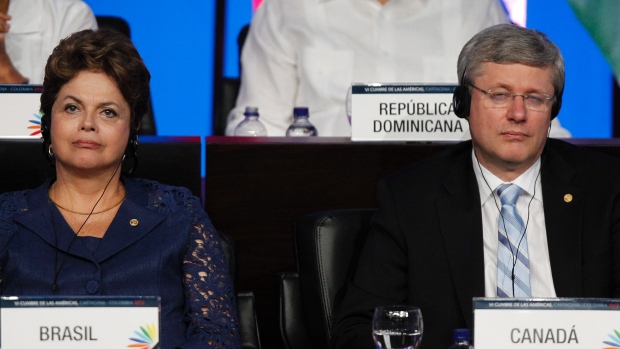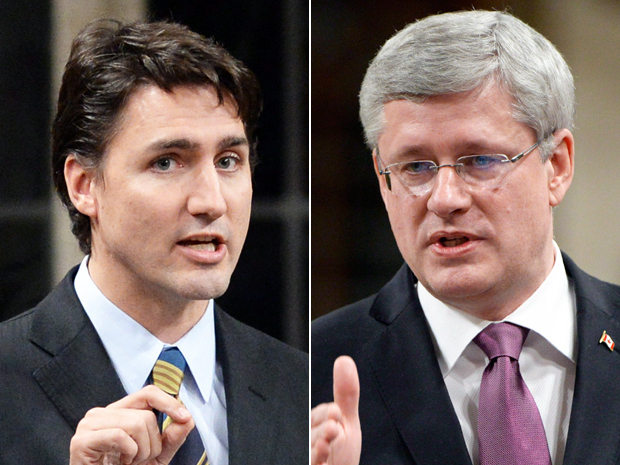On October 7th, Brazilian President Dilma Rousseff issued a torrent of tweets in response to reports of economic espionage carried out by Canada’s electronic spy agency, Communications Security Establishment Canada, against the Brazilian mining industry. The report was presented by Brazil’s Globo network and was based on documents leaked by former US National Security Agency contractor Edward Snowden.
President Rousseff tweeted that such espionage “is unacceptable among countries that claim to be partners. We reject this cyberwar,” and “the United States and its allies must immediately stop their spying activity once and for all.” In other words, President Rousseff expressed outrage that Brazil was a target of the ‘Five Eyes’ spy network, an intelligence alliance between the US, UK, Canada, Australia and New Zealand.
In response to these sharp comments, Prime Minister Stephen Harper stated, “Canadian officials are reaching out very proactively to their counterparts and you’re not going to be surprised by my answer: I’m very concerned about this story and about some of the reports around it.” Whether or not Harper is genuinely shocked to learn of the industrial espionage carried out by CSEC, he insinuates that the issue is the lack of adequate supervision over Canadian intelligence agencies. Evidently, the inexorable global growth in intelligence and information gathering has made the practice of espionage itself a non-issue. Rather, domestic and international criticisms of Canada’s espionage activities have focused on the accountability and economic espionage of CSEC. Lets start with domestic concerns.
Where’s Canada’s Watchdog?
To date, the only oversight of Canada’s security intelligence is conducted by the Communications Security Establishment Commissioner, Robert Décary. As set out in the National Defense Act and the Security of Information Act, the Commissioner is mandated to review CSEC’s intelligence activities and ensure that it is in compliance with laws protecting the privacy of Canadians. The results of Décary’s last annual report to Parliament were unsettling. He reported, “After in-depth and lengthy review, I was unable to reach a definitive conclusion about compliance or non-compliance with the law.” At the time of its release it made some headlines. Last week’s reports however, have caused politicians and political commentators to demand an end to this accountability gap. Calls for reform are hardly new.
In 2004 MP’s from the House of Commons and Senate were appointed to advise the government on how parliamentary oversight should be implemented in Canada. The committee’s report argued that the then-current status quo of parliamentary scrutiny regarding the intelligence community was insufficient. It noted that Canada was the only member of the ‘Five Eyes’ alliance that lacked legislative scrutiny or oversight of national security matters. A change in government in 2006 disrupted the movement for reform. Perhaps suitably, Harper’s key opponent in the 2015 federal elections, Liberal leader Justin Trudeau, has made parliamentary oversight of Canada’s national security agencies part of his platform. The Liberal party intends to table such legislation this fall. Evidently exposure of Canadian espionage may lead to positive reform in the domestic context. This is not the case in the international context.
Weathering the Storm
Canada has quite vocally proclaimed its aim to diversify its trade beyond the American market. However, greater economic ties with Brazil, the 6th largest economy globally, may be off the table. After all, as President Rousseff implied, partners should trust each other. Canada’s recent espionage for strategic economic purposes isn’t exactly reassuring.
Though undefined under international law, espionage is tolerated and mandated by national intelligence agencies if in accordance with certain accepted norms or aims. If conducted to prevent terrorism and protect national security, mass surveillance is cloaked with legitimacy. If performed to achieve self-interested goals such as commercial and industrial advantages over the competition however, espionage is on shakier ground.
Canada’s spying activities look even worse when it is considered alongside its membership in the “Five Eyes” alliance. Whether or not Canada was scratching its southern neighbor’s back by snooping on Brazil, as some political commentators allege, the image it paints of Canada is not flattering. Essentially, Canada looks like a member of gang of heavy weight bullies who use their global surveillance net to achieve economic advancement.
Perhaps this is an exaggeration. However, coming on the heels of reports released late this summer that the US intelligence agencies had engaged in industrial espionage and monitored millions of emails and phone calls of Brazilian citizens, it isn’t completely off-base. After all, greater were the efforts to spy on the President herself. Regardless, these reports will not seriously undermine the Five Eyes alliance. Canada will withstand the potential trade pitfalls, international condemnation and the chink in its reputation. After all, the security benefits of the intelligence alliance significantly outweigh the costs of exposure.
Conclusion
Snowden’s leaks challenge the cohesiveness of the ‘Five Eyes’ alliance by weakening trust and confidence in the US. However, members understand that evolving security threats demand greater cooperation and thus the alliance is far from future disintegration. Ultimately, a sound response to the international concerns of economic espionage would be to address domestic concerns and implement parliamentary oversight. In so doing the Canadian government demonstrates to the international community that it is bringing its intelligence agencies under closer scrutiny and thus ensuring that it acts within its role and according to its responsibilities. Essentially, this would be a successful face-saving move.




